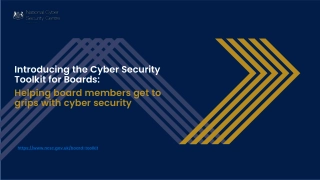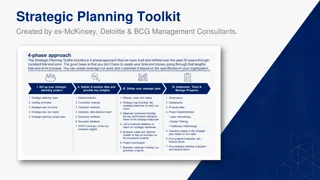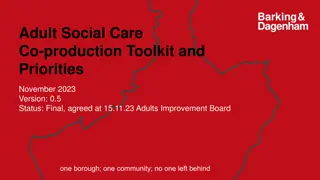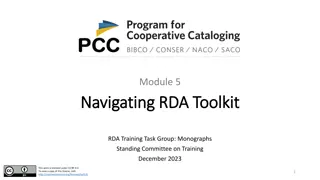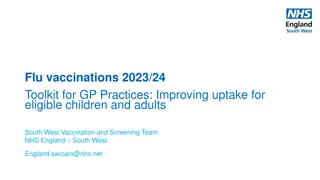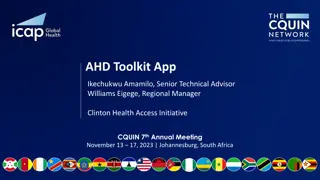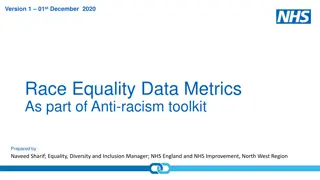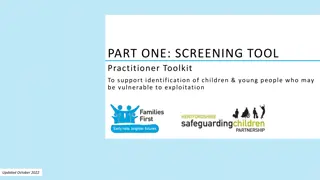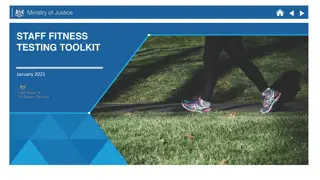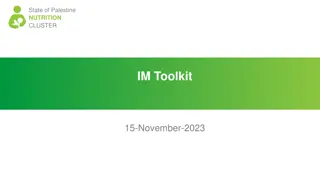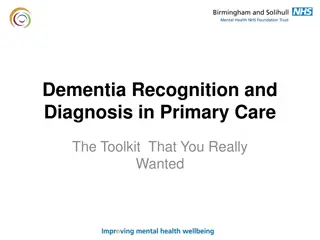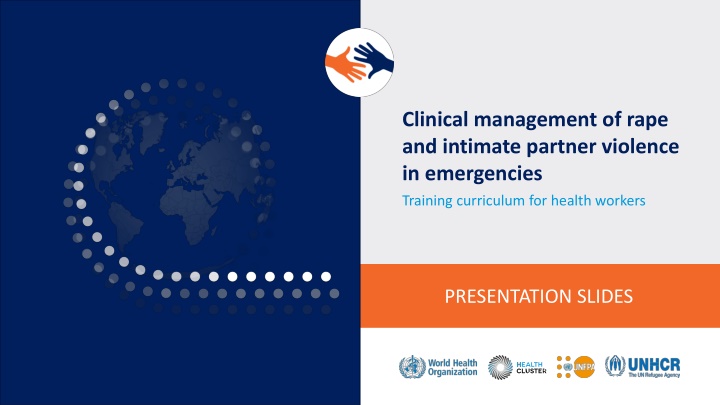
Effective Strategies for Providing Survivor-Centered Care in Emergencies
Explore a comprehensive training curriculum for health workers on the clinical management of rape and intimate partner violence in emergencies. Learn about guiding principles, session objectives, and practical applications to ensure dignified, respectful, and supportive services for survivors.
Download Presentation

Please find below an Image/Link to download the presentation.
The content on the website is provided AS IS for your information and personal use only. It may not be sold, licensed, or shared on other websites without obtaining consent from the author. If you encounter any issues during the download, it is possible that the publisher has removed the file from their server.
You are allowed to download the files provided on this website for personal or commercial use, subject to the condition that they are used lawfully. All files are the property of their respective owners.
The content on the website is provided AS IS for your information and personal use only. It may not be sold, licensed, or shared on other websites without obtaining consent from the author.
E N D
Presentation Transcript
Clinical management of rape and intimate partner violence in emergencies Training curriculum for health workers PRESENTATION SLIDES
Session 3. Guiding principles for health response to sexual assault and IPV in emergencies 3.2
Session objectives Objective 2: Demonstrate behaviours and understand values contributing to safe and supportive services Competencies: Know the guiding principles of providing survivor-centred care in a culturally appropriate way Understand how to apply the guiding principles for survivor-centred care in your practice Understand how first-line support, or LIVES, supports survivor-centred care 3.3
Guiding principles I Dignity and respect the right to be treated with dignity and respect, and not to be blamed for the violence perpetrated against them Privacy and confidentiality survivors always have the right to choose to whom they will or will not tell their story; any information should only be shared with the survivor s informed consent Self-determination the right to make one s own decisions, including sexual and reproductive decisions; to refuse medical procedures and/or take legal action; and to choose the course of action Non-discrimination survivors should receive equal and fair treatment regardless of their age, impairments, gender identity, sexual orientation, religion, nationality, ethnicity, employment or any other characteristic 3.4
Guiding principles II Survivor-centred care further promotes the following Life the right to a life free from fear and violence The highest attainable standard of health the right to health-care services of good quality, that are available, accessible and acceptable Information the right to know what information has been collected about one s health and to have access to this information, including medical records 3.5
Guiding principles in practice A survivor s wishes determine the care that you give Do not blame or judge Do no harm by: limiting actions to a context-appropriate scope respecting human rights promoting gender equality always ensuring confidentiality 3.6
Promoting gender equality Health workers must promote women s autonomy and dignity Be aware of the power dynamics and norms that perpetuate GBV and how these may affect a survivor s ability to safely access and continue to receive health care Be careful not to put the survivor at further risk through your actions or recommendations Provide information and counselling that helps the survivor make their own decisions 3.7
Equity in access and care Never assume you know what a patient needs or wants. Instead, empower the patient to be part of their care by asking first. Remember, a survivor s wishes determine the care that you give. 3.8
Equity in access and care1 Does the person have access to information they can understand and relate to? Does the patient need additional support to access services? Are treatment guidance and referral options delivered in a communication style that works for the patient? Do signage, entryways and facility flow welcome and accommodate the patient s needs? 3.9
Guiding principles for caring for children and adolescents All core principles apply to survivors of any age. Pay attention to the best interests of children and adolescents. There may not be another adult looking out for the child s best interest. Provide information and offer choices that are appropriate for their age: use communication tools and history-taking aids that are appropriate to the age and developmental stage of the survivor. Respect young people s autonomy and agency even when they are younger than the legal age of consent; ensure the participation of children or adolescents in decisions that have implications for their lives. 3.10
Ensure survivor-centred, evidence-based responses regardless of the person s initial reason for seeking care Health workers are likely to encounter survivors of sexual assault or IPV in a range of clinical settings, including: STI or HIV care Child immunization Child feeding programmes Adolescent health Mental health Abortion or post-abortion care Maternal health (antenatal or postnatal) Family planning services Mobile outreach Emergency departments 3.11
Why not universal screening? It is rare for a health system to have capacity to respond to all people who have experienced violence. It can be harmful to bring up GBV without full-scope referral options in place. If given space, compassion and safe opportunity, survivors who want to disclose will do so. General messages about how GBV is never the survivor s fault, available resources for survivors, and the provider s availability to listen and offer support can be provided without a disclosure of violence. 3.12
First-line support A continuum of health-sector services Primary focus of this training Non-specialist disclosure response Comprehensive, clinical, first-line support Medico-legal response 3.13
First-line support Learn to listen with your: Eyes giving her your undivided attention Ears truly hearing her concerns and questions Heart hearing with caring and respect 3.14
First-line support Supporting with basic psychosocial care means to: Help strengthen positive coping methods Explore availability of social support Teach stress-reduction exercises Make regular follow-up appointments Assess for moderate-to-severe depression or post-traumatic stress disorder (PTSD) 3.15
Session 3: Thats a wrap! The health system response should be based on respect for human rights and promotion of gender equality Children and adolescents will need additional considerations based on the principles of best interest and evolving capacities The training prepares qualified health workers to provide first-line support and clinical care for survivors of sexual violence and IPV 3.16
Reference 1. Adapted from: Disability-inclusive health services toolkit: a resource for health facilities in the Western Pacific Region. Manila: World Health Organization Regional Office for the Western Pacific. 2020;11.

